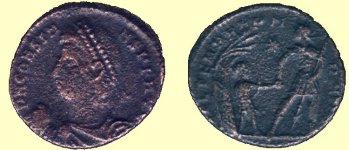
Constans 337 - 350 A.D.
By clicking on the pictures you'll be linked to a more complete description of the coin. At the bottom of this page there is a more elaborate biography of the emperor.
 |
Obverse: DN CONSTANS PF AVG |
| Reverse: FEL TEMP REPARATIO | |
|
Fieldmarks: *
|
|
| Exergue: - |
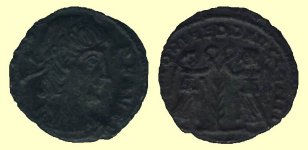 |
Obverse: CONSTANS PF AVG |
| Reverse: VICTORIAE DD AVGG Q NN | |
|
Fieldmarks: -
|
|
| Exergue: - |
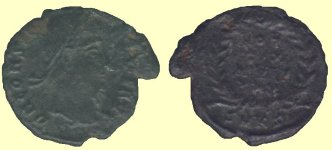 |
Obverse: DN CONSTANS PF AVG |
| Reverse: VOT XX MVLT XXX | |
|
Fieldmarks: -
|
|
| Exergue: SMKS |
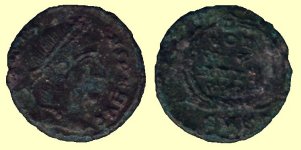 |
Obverse: DN CONSTANS PF AVG |
| Reverse: VOT XX MVLT XXX | |
|
Fieldmarks: -
|
|
| Exergue: SMK? |
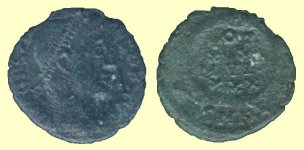 |
Obverse: DN CONSTANS PF AVG |
| Reverse: VOT XX MVLT XXX | |
|
Fieldmarks: -
|
|
| Exergue: SMKA |
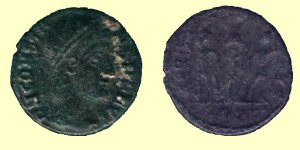 |
Obverse: DN CONSTANS PF AVG |
| Reverse: GLORIA EXERCITVS | |
|
Fieldmarks: -
|
|
| Exergue: SMKΓ |
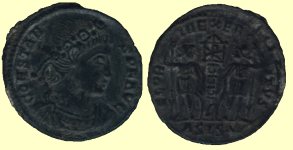 |
Obverse: CONSTANS PF AVG |
| Reverse: GLORIA EXERCITVS | |
|
Fieldmarks: -
|
|
| Exergue: ASIS |
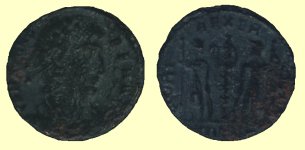 |
Obverse: CONSTANS PF AVG |
| Reverse: GLORIA EXERCITVS | |
|
Fieldmarks: -
|
|
| Exergue: unreadable |
Constans 337 - 350 A.D.
Flavius Julius Constans, third and youngest
son of Constantine I and Fausta, was
born around 320 AD. Raised as a Christian, he was given the rank of Caesar on
the 25th of December 333. After the death of their father on the 22nd of May
337 Constans and his two brothers (Constantine
II and Constantius II) slaughtered almost
all of their relatives, because they were considered potential traitors and
threats to the new emperors. After this massacre they met in the first part
of September 337 in Pannonia
to re-divide the empire among themselves. There they were acclaimed Augusti
by the army and Constans' new realm consisted of Italy,
Africa,
Illyricum,
Macedonia,
and Achaea.
It would appear that Constans was quite
successful in the military sphere. Following his accession to the purple in
337, he won a victory over the Sarmatians.
In 340 AD, Constans got into a dispute with his brother Constantine
II over the administration of Italy
and Constantine's claim to the title of senior Augustus. Constantine II led
an army against his younger brother while he was away on a military campaign
but was surprisingly defeated by a small force urgently dispatched from Constans'
main army to slow down the invaders progress. They ambushed and killed Constantine
II in a battle near the northern Italian city of Aquileia.
Constans now became ruler of the entire Western Roman Empire. The next decade
was a more peaceful one. Constans defeated the Franks
so decisively that they agreed to become a vassal nation and help defend Rome’s
frontiers on the Rhine against other Germanic barbarians. In 343, Constans visited
Britain
(the last emperor to do so for nearly a thousand years) in order to deal with
the barbarian Picts
and Scots
who had crossed the Northern defenses and were wreaking havoc amongst the settled
Romano-British farmers and townspeople. Constans also had to deal with Donatist
(a faction of Christians who had split of from the main church) related bandits
in North Africa.
Like his father Constantine I and his brother Constantius II, Constans had a deep interest in Christianity. Together with Constantius II he issued (or perhaps re-issued) a ban against pagan sacrifice in 341. The next year however, they cautioned against the destruction of pagan temples. Constans was briefly engaged to Olympias, the daughter of a Praetorian Prefect but the marriage was continually postponed for political reasons and also because of his homosexual activities.
Later during his reign Constans became a very unpopular ruler who behaved like a tyrant and caused a lot of corruption. The emperor apparently attempted to obtain as much money as he could from his subjects and sold government posts to the highest bidder and his favorites were allowed to oppress his subjects. He was especially unpopular with the troops, for which he had unconcealed contempt, so much so that they overthrew him. In January of 350 AD a mutiny in Gaul was led by Magnentius, a former slave of Constantine who had become Constans' army chief. Magnentius proclaimed himself Augustus at Augustodunum . Constans was caught unaware (while on a hunting expedition) and took refuge in a temple at the town of Helena at the base of the Pyrenees but was put to death by a band of Magnentius' assassins who dragged him from the temple and killed him on the spot. Magnentius became emperor in the West in 350 and his act of treachery went unpunished until Constantius II, the only surviving member of the three brothers defeated Magnentius after several bitter fights in 353.